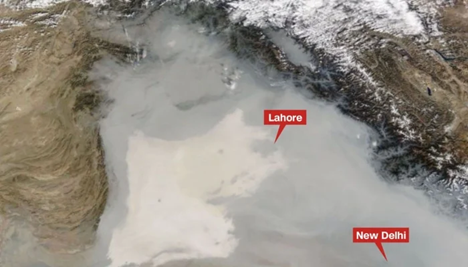Only in Pakistan, 10 million children are at risk of developing respiratory disease[1]. This intensifying environmental crisis has become a key issue for COP 29, a summit organized by the United Nations in Baku[2]. The challenge for environmental activists is how to increase awareness. Eco-theological interpretations can contribute to human behavioral changes in times of climate change. Teachings inspired by the Bible and the Quran have the potential to inspire a global commitment to care for our planet. This blog explores what insights the Bible and the Quran have to offer for human responsibility toward the environment.

Image 1: India and Pakistan trapped in a blanket of fog, nothing is visible on the ground. Picture taken by NASA (courtesy BBC Urdu).
STEWARDSHIP IN THE BIBLE
At the beginning of the Bible, in the Book of Genesis, one can read that God created humanity in His image as man and woman. He blessed them and told them to fill the earth and subdue it, and “have dominion” over every creature (1:27-28; NRSV) What does it mean to be created in God's image, and what kind of authority does this “dominion” grant?
Verse 27 introduces the powerful idea that humans hold a unique, exceptional role, but being made in God’s image does not imply that humans possess a divine DNA; rather, it signifies a sacred appointment. God entrusts humanity with the care of His creation, asking them to exercise this authority with the love and responsibility God does. This interpretation of dominion aligns with the idea in Persian and Arabic traditions, where kings are called zil-e-Elahi, meaning the shadow of Allah. The Arabic word zil, cognate of the Hebrew צֶלֶם (tselem), suggests a representative or shadow of the patron God, a concept Genesis developed from the Ancient Near East, where kings were considered images of their patron gods, personifying divine virtues and acting as earthly stewards.[3]
The notion of humanity as God’s stewards is further supported by scholars like Hiebert, who argues that the Hebrew phrase naʿăśê (“let us make”) followed by the imperfect verb wa-yirdû (“they will rule”) indicates purpose; that is, to serve as His stewards on Earth, reflecting divine virtue of care.[4] Thus, rather than “dominion” in the sense of unrestricted power, a more accurate interpretation might be “to care for” as God’s appointed stewards.
Genesis also reinforces stewardship through blessings. In Genesis 1:22, God blesses all living creatures with fertility. Finally, in Genesis 2:2, God blesses the seventh day with rest, emphasizing well-being and the cyclical nature of care and restoration for every creation.
THE CONCEPT OF KHILAFAH IN THE QURAN
In continuation of the biblical idea of stewardship, the Quran also has a similar idea about human stewardship. For example, Al-Quran 2:30a states, “And [mention, O Muhammad], when your Lord said to the angels, ‘Indeed, I will make upon the earth a successive authority.’”[5] The Arabic word translated as successor comes from the root خلف (khlf), which is used 127 times. Every time it is used as a noun, it refers to someone who acts in place of someone senior, such as Aaron on behalf of Moses (7:142) or one who takes something as an inheritance (7:169). A similar idea is expressed in 6:165: “And it is He who has made you successors upon the Earth and has raised some of you above others in degrees [of rank] that He may try you through what He has given you.”[6] The latter half of the verse shows that this dominion comes with a sense of responsibility. Since Allah is merciful to his creatures, humans, as Allah's Khalifah, are also supposed to be merciful.

Image 2: Careful Attitudes Toward Creation (Courtesy www.freepik.com)
Moreover, the Quran also stresses the idea of mizan, which is to keep a balance in spending/using. In 7:31, the Quran teaches, "O children of Adam, take your adornment at every masjid and eat and drink, but be not excessive. Indeed, He likes not those who commit excess.” Mizan is the primary idea, along with Khilafa, which Muslim communities have used in recent years to advocate sustainable living under initiatives like the Green Muslim Movement.[7]
COMMON ETHIC OF STEWARDSHIP
From the comparison of both scriptures, it is clear that
- Interpretations of the unique position of humans in creation (based on Genesis), and human appointment as "Khalifa" (in the Quran), suggest that nature should be taken care of with a sense of responsibility.
- Both ideas offer a line of thought to reject human attitudes of selfish exploitation of (non-human) nature.
Both holy books thus offer principles for sustainable interaction with nature. The complementary parallelism between the Quranic concept of Khalifa suggests that our faith, Christian or Muslim, calls all the children of Abraham to our shared environmental responsibility. An advocacy based on our common teachings may strengthen the cause of environmental protection. The situation described at the beginning of this blog requires an urgent call to action. In order to be faithful to our stewardship, we all have to say yes to this call, as our shared call.
[1] https://urdu.geo.tv/latest/386431 (accessed December 18, 2024)
[2] https://www.theguardian.com/environment/2024/nov/08/cop29-climate-talks-what-would-a-good-outcome-look-like (accessed December 18, 2024)
[3] Mark S. Smith, The Priestly Vision of Genesis 1 (Minneapolis: Fortress Press, 2010), 99–100.
[4] Theodore Hiebert, “Retranslating Genesis 1–2: Reconnecting Biblical Thought and Contemporary Experience,” The Bible Translator 70, no. 3 (December 2019): 261–72.
[5] Talal Itani, Quran in English: Clear and Easy to Understand. Modern English Translation; 2014.
[6] Talal Itani, Quran in English: Clear and Easy to Understand. Modern English Translation; 2014.
[7] Ömer F. Gürlesin, “Al Mizan, an Islamic Covenant for the Earth,” March 25, 2024, https://www.religionclimate.org/nl/blog/blogs-1/al-mizan-an-islamic-covenant-for-the-earth-23 .(accessed December 18, 2024)
Bibliography
Hiebert, Theodore. “Retranslating Genesis 1–2: Reconnecting Biblical Thought and Contemporary Experience.” The Bible Translator 70, no. 3 (December 2019): 261–72. https://doi.org/10.1177/2051677019877229.
Itani Talal. The Quran in English Clear and Easy to Understand: Modern English Translation. Dallas/Beirut: Clear Quran, 2014.
Ömer F. Gürlesin. “Al Mizan, an Islamic Covenant for the Earth,” March 25, 2024. https://www.religionclimate.org/nl/blog/blogs-1/al-mizan-an-islamic-covenant-for-the-earth-23.
Smith, Mark S. The Priestly Vision of Genesis 1. Minneapolis: Fortress Press, 2010.
Umer Draz Nangiana and Swaminathan Natarajan. “Pictures from Space Show Mighty Smog Choking Lahore,” 9 November. https://www.bbc.com/news/articles/cm20k76d5xno.


Stewardship or Dominion: Christian and Muslim Theological Perspectives on Stewardship and Environmental Ethics